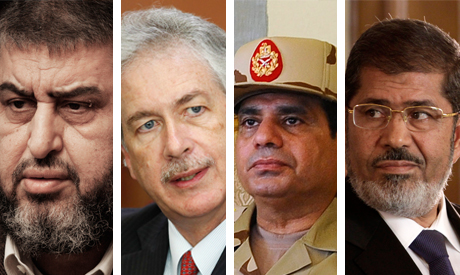 UAE foreign minister Abdullah bin Zayed, his Qatari counterpart Khalid Al-Attiyah, and US Deputy Secretary of State William Burns were scheduled to visit the Muslim Brotherhood's second-man Khairat El-Shatar in Tora Prison on Sunday night, government sources told Ahram Online.
UAE foreign minister Abdullah bin Zayed, his Qatari counterpart Khalid Al-Attiyah, and US Deputy Secretary of State William Burns were scheduled to visit the Muslim Brotherhood's second-man Khairat El-Shatar in Tora Prison on Sunday night, government sources told Ahram Online.
The trilateral delegation had aimed to present the Islamist leader with an initiative to at break the political deadlock and circle of violence that engulfed the country since the ouster of former president Mohamed Morsi.
However, El-Shater, who has been detained on charges of inciting to kill protesters since 6 July, has refused to meet with the US, UAE, and Qatari officials to discuss the deal, Al Jazeera TV reported.
"Mohamed Morsi is the legitimate president of Egypt. They should go talk to Morsi," declared El-Shater according to the Qatari based network.
Meanwhile, Egypt's interior ministry said late on Sunday that no delegation from the United States or the European Union visited El-Shater in prison.
Ahram Online has learned that the trio's deal calls for the replacement of Prime Minister Hazem El-Beblawi, who Morsi supporters harshly criticise and accuse of bias, with a premier that is viewed as more independent and objective. However, no specific figure was offered as El-Beblawi's potential successor.
The deal also proposes the formation of a new cabinet, which would include three ministers from the Muslim Brotherhood in addition to two Salafist ministers. The incumbent government does not include any Islamist figures, as the Brotherhood and other Islamist forces have refused participation in protest of Morsi's ouster.
Furthermore, the deal entails a Brotherhood-orchestrated dispersal of the pro-Morsi sit-ins held in Cairo. Tens of thousands of Morsi loyalists are maintaining three sit-ins; one near Nasr City's Rabaa Al-Adawiya Mosque, a second in Giza's Nahda Square, and a third in Heliopolis' Alf Maskan area.
The trio proposes that the 2012 constitution, which was frozen as part of the armed forces' political roadmap, be amended as planned, with Islamists included in the 50-man committee tasked with drafting the amendments. Islamist figures would also participate in drafting the law regulating the upcoming parliamentary elections.
Should the deal be accepted by all sides, the Muslim Brotherhood, founded in 1928, would not be disbanded. The law regulating political parties would not exclude religious parties, such as the Brotherhood's Freedom and Justice Party or the Salafist Nour Party.
The deal guarantees that charges leveled against a number of Islamist figures "will not be politicised," and be subject instead to independent investigation by the judiciary.
Last week, a top Egyptian court ordered Morsi's detention for 15 days pending investigations into his suspected collaboration with the Palestinian Islamist group Hamas, an ideological offshoot of the Brotherhood.
Morsi has been held incommunicado ever since his overthrow on 3 July, which was part of the armed forces' plan for Egypt following nationwide mass protests against the former elected president.
Ahram Online has learned that the proposal was discussed with Egypt's interim Vice President for foreign affairs Mohamed ElBaradei and is negotiable.
The UAE and US officials have rescheduled their itinerary in order to leave on Monday, extending their stay by one day. The Qatari minister, who was also scheduled to leave on Sunday, has yet to set a date for his departure.
Qatar has been a strong backer of Morsi's Muslim Brotherhood, granting Egypt some $7 billion in aid during his year in power. Conversely, the UAE, along with Saudi Arabia and Kuwait, have welcomed the army's ouster of Morsi.
Western and Arab states, unsettled by the deepening turmoil in the Arab world's most populous state, have been working to mediate between Egypt's interim administration and allies of the toppled president.
Burns, along with European Union envoy Bernadino Leon, met with army chief Abdel Fattah El-Sisi on Sunday, according to an army statement that did not comment further. The representatives sat earlier with government officials and Morsi allies.
US President Barack Obama has also asked two senators to travel to Egypt "soon" to hold talks with the interim government and the opposition.
In a meeting with US and EU envoys on Saturday, a spokesman from a pro-Morsi delegation said they are open to solutions but expressed rejection of any involvement of El-Sisi in a potential agreement.
Morsi's supporters also demanded the restoration of the 2012 constitution.
Tensions have been running high in Egypt amid calls for Morsi supporters to end their Cairo sit-ins and return to the political process. Morsi's camp has remained defiant in the face of government orders and interior ministry threats to disband.



